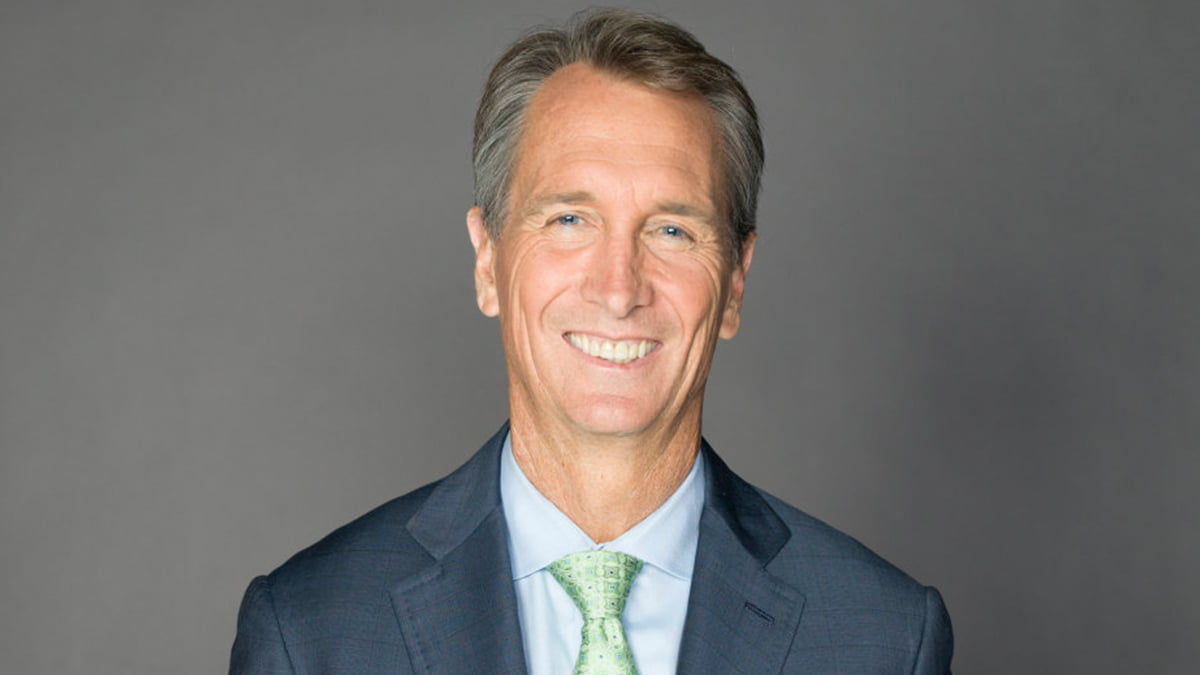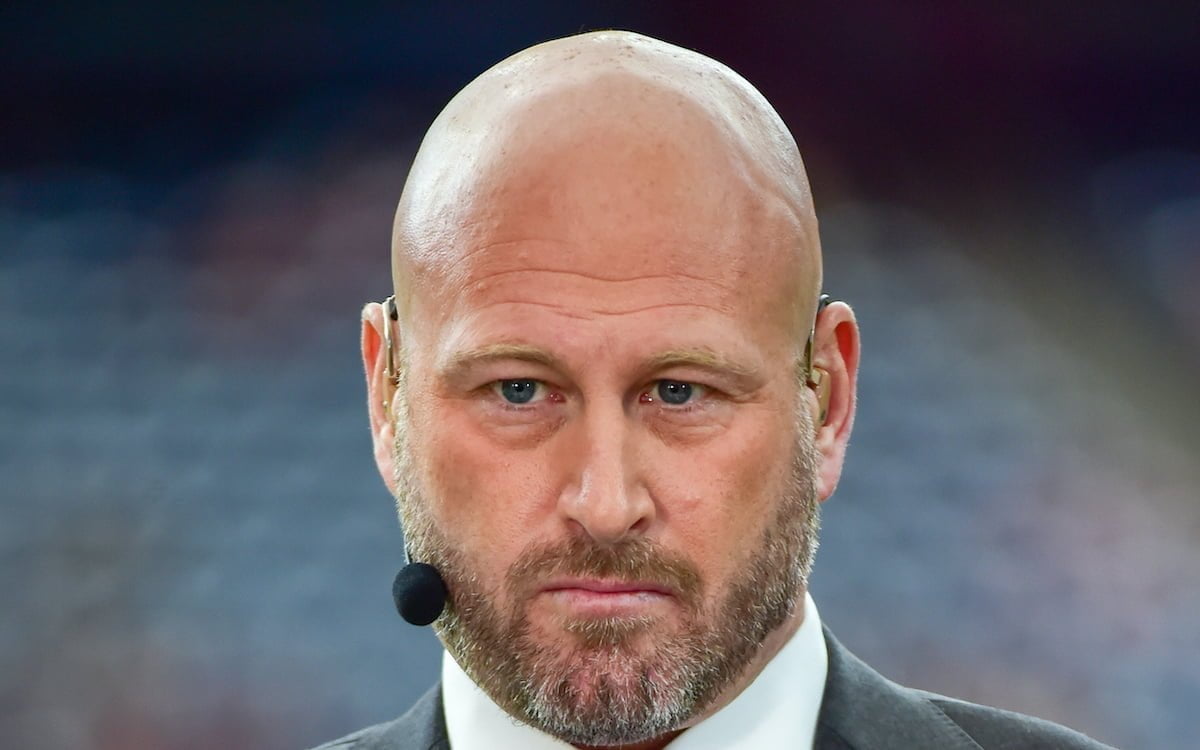Wearing a uniform prominently displaying the team logo and player number, each player on the team prepares to take the gridiron. Regardless of the weather, the players run down the tunnel and are introduced to the crowd in a packed stadium, quickly becoming acclimated to their environment as they look for a victory. From the moment the coin flips until the end of the game, these athletes possess an intense focus on winning the contest and subsequently react to dynamic circumstances. Although he is no longer playing, Cris Collinsworth still takes center stage on gameday, except from inside a broadcast booth aligned with midfield.
While teams are able to accurately prognosticate parts of the game, real-time adjustments and other factors can engender unpredictable occurrences and outcomes. Collinsworth knows this well, unexpectedly stepping into the Sunday Night Football booth two years after returning to NBC Sports. Fifteen seasons later, he has been on the call for five Super Bowl championships and is the longest-tenured analyst in the history of an NFL prime-time television broadcast package.
As Collinsworth continues his work on Sunday Night Football with play-by-play announcer Mike Tirico, sideline reporter Melissa Stark, director Drew Esocoff and coordinating producer Rob Hyland, he considers himself fortunate to be part of a stellar, cohesive group of teammates.
“There’s not the in-fighting; there’s not the silliness that can go on in the corporate world sometimes,” Collinsworth said. “It’s really [that] everybody is talented and trying to pull their weight and make it easier, not harder on our co-workers.”
Throughout his playing career, Collinsworth was honored with various accolades and merits recognizing his aptitude and excellence on the football field. These characteristics have ostensibly evinced themselves as a sports media professional as a 17-time recipient of a Sports Emmy Award and recent inductee into the Sports Broadcasting Hall of Fame. Collinsworth was taken aback to see a preponderance of his colleagues, family and friends on hand for the ceremony.
“It’s funny – those Hall of Fame or awards kind of ceremonies forced me to do something I don’t do comfortably, which is look backwards,” Collinsworth said. “I try to always look forward, but that night forced me to look backwards and really appreciate how lucky I am to have the kind of people I have in my life.”
Before beginning his work in sports media, Collinsworth played college football at the University of Florida where he was a standout wide receiver and completed a degree in accounting. Upon being drafted to the National Football League by the Cincinnati Bengals, he earned Pro Bowl honors and finished second in voting for the Offensive Rookie of the Year award.
After his retirement from the league, Collinsworth began his immersion into media as the host of a sports talk radio show on 700 WLW. Over the next decade, he interacted with an innumerable number of callers and discussed collegiate and professional sports in the Cincinnati area.
Bob Trumpy, a former tight end for the Bengals, preceded him in the role before departing the outlet to take on more assignments calling games for NBC Sports both on television and radio. Even though he was approaching his third of eight seasons in the NFL, Collinsworth filled in for Trumpy for a previous edition of the Sports Talk program alongside Jeff Ruby. By the time he was added to the fill-in rotation in 1988, he knew of the task at hand.
“It’s the hardest thing I’ve ever done,” Collinsworth said. “You go in a studio; you’ve got three hours in a microphone and people think that the listeners just call no matter what you do. They don’t. You’ve got to make them call; you’ve got to make them want to call.”
Collinsworth worked with various radio hosts such as Andy Furman and Bill Cunningham and aimed to hone his craft. He made mistakes along the way and discovered different nuances of the medium while also being a good teammate for his colleagues. Moreover, he had to be genuine with his audience in order to get the listeners to engage with the program, offering his opinions on the teams and making sales calls on behalf of the company.
“You had to welcome guests in that you may not otherwise have on the show and interview people [where] you didn’t know anything about them or their sport,” Collinsworth said. “Yeah, it was a better education than I got doing anything else in my life, I’ll say that for sure.”
At the same time, Collinsworth was attending law school at the University of Cincinnati and might have considered a career as a tax attorney had he not worked in sports media. Three weeks after he was cut by the Bengals, Collinsworth was offered and subsequently accepted a position on the HBO program Inside the NFL as a reporter responsible for filing features. Aside from the radio show, legal studies and reporting work, he also filled in as a color commentator on four college football games for NBC Sports. By the next year, Collinsworth was on nine of these live game broadcasts and became a regular member of the studio cast of Inside the NFL – all while continuing to host on the radio.
“I was talking about everybody, everything, everywhere,” Collinsworth said. “…There was no internet; [it] wasn’t like you could look up something on the internet, so whatever you knew was something you saw or read about, and it was just wild. The decade of the ‘90s clearly was the craziest time of my life.”
Utilizing the versatility he strived to develop, Collinsworth seamlessly made the move into the studio as a member of The NFL on NBC Pregame Show beginning in the 1996 season. Every week, he provided his insights and intellect surrounding the slate of games taking place around the league. Collinsworth was on a panel with host Greg Gumbel and analysts Joe Gibbs and Ahmad Rashad before a seminal moment in the broadcast history of the NFL occurred.
NBC lost broadcasting rights to the NFL when CBS agreed to an eight-year contract with the league to serve as the television home of all AFC games, a deal that was worth an estimated $500 million per year. At the suggestion of NBC Sports company chairman Dick Ebersol, Collinsworth left the outlet and joined FOX Sports as part of its FOX NFL Sunday studio program, retaining his presence within the fabric of football coverage. Over the ensuing four seasons, he had the chance to work alongside host James Brown and analysts Terry Bradshaw and Howie Long, augmenting his ability to seamlessly implement entertainment and moments of levity into nuanced football esoterica.
“I’m glad I did,” Collinsworth said of leaving NBC Sports. “I learned a lot from them and then skipped over to do the games.”
FOX Sports shuffled its announcing lineup in 2002, assigning Collinsworth to a new three-person booth including play-by-play announcer Joe Buck and color commentator Troy Aikman. The alteration resulted from John Madden’s decision to sign a contract to call Monday Night Football games on ABC with play-by-play announcer Al Michaels after his contract expired, timing with Pat Summerall’s initial retirement.
Rather than having one analyst replace the distinguished broadcaster and former Super Bowl champion with the Oakland Raiders, the network opted to instantiate a new lead booth. The endeavor marked a new challenge for Collinsworth since he had never been part of a broadcast triumvirate before. Additionally, he continued to host his Sports Talk radio program while having a family and traveling the country to call these weekly matchups.
“Ordinarily you hit a button and you talk to the producer and you tell them what you want to talk about,” Collinsworth explained. “Well Troy and I were seeing different things all the time, and Richie Zyontz, our poor producer; it was like a gameshow. Did Troy or I hit the button first to get into Richie to try and say something?”
NBC agreed to a six-year contract that granted it rights to a new league prime-time television broadcast package, Sunday Night Football, and two Super Bowl championship games, ahead of the 2006 season.
“When NBC got football back, Dick Ebersol called me right away and I ended up coming back to NBC,” Collinsworth said. “I did the studio again for about three years there and then John retired – surprised all of us – and that’s when I went back in to replace him again.”
Prior to that time though, Collinsworth’s presence was expanding as a member of three different broadcast networks covering the NFL. Whether it was working on Football Night of America on NBC, co-hosting Inside the NFL on HBO or contributing to NFL Network programming, his shrewd expertise and attention to detail was conspicuous.
When he started working with Al Michaels regularly on Sunday Night Football in 2009, he had been known as someone who tried to be authentic with the audience. After all, he had balanced objectivity and subjectivity for several years in a variety of different roles where he gradually earned the trust of consumers.
“I think I learned that you don’t have to be mean-spirited, but you’ve got to be honest and you’ve got to be willing to say what others may not feel comfortable saying because your relationship isn’t really with the players and coaches anymore; it’s with the audience,” Collinsworth articulated. “It’s with the people that are watching on television, and you have to earn their trust that whether it’s something positive or negative that you’re saying, it’s what you honestly believe.”
Collinsworth has always tried to take the approach that he is supplying commentaries for the benefit of the viewers. Throughout the week while fans take part in activities unrelated to the game, he is watching film, having conversations with personnel and determining what he believes will be salient and apropos before kickoff.
Much like suiting up on the field though, the game is unpredictable and it is imperative to be nimble enough to adjust in real time. Maintaining a keen awareness of his audience filled with consumers possessing varied levels of fandom, he does not want to “sell anyone anything;” rather, he aspires to convey his knowledge without overwhelming viewers.
“They want to take three hours and watch a football game and not have the announcer wear them out [or] feel like the announcer’s a shill for players and coaches in the league,” Collinsworth said, “but know that I’ve done my homework and hopefully it’s a little bit fun [and] a little bit relaxing…. I want to tell you I’ve researched it for a whole week [and that] I know what’s going on with these teams, and by the end of it, I hope you know a little bit more about it as well.”
Aside from his pedagogical abilities wherein he translates recondite concepts into comprehensive parlance with aplomb, Collinsworth has become synonymous with entertaining aspects of the game. When NBC previously opened Sunday Night Football games, Al Michaels would appear solo on camera to deliver a monologue about the game before the shot panned to include Collinsworth in the frame. That tradition ended when Mike Tirico assumed play-by-play responsibilities on the broadcast, but Collinsworth was worried that Michaels’ departure would cause more than just a change in the open format.
“Mike is really talented – I mean really talented – and really works hard,” Collinsworth said. “He does all the special teams stuff for us, he talks to the general managers most weeks [and] he is a research machine. He just absolutely is and I have great respect for that, but we’ve also kind of struck a personal relationship that I was afraid I was going to really miss because Al and I were really good friends.”
NBC Sports recently underwent a change in leadership with the appointment of new division president Rick Cordella. Collinsworth has great respect for the broadcast network, claiming that Dick Ebersol is probably the person who has had the greatest influence on him outside of family members. Ebersol resigned from the company in 2011 and was succeeded by Mark Lazarus, who currently serves as the chairman of NBCUniversal Media Group.
“[He was] a guy who believed in me when I gave him no reason to believe in me or when I was making big mistakes or whatever,” Collinsworth said. “He just kept giving me new opportunities and [I will] be forever grateful to him. And maybe it’s part of Dick’s legacy – he hired most of the people that work at NBC now – but they’re just good people and everybody wants to make it better.”
Before Cordella’s promotion, Pete Bevacqua had been leading the business unit, which also broadcasts games in the Big Ten Conference, NASCAR and the Olympic Games. Bevacqua left the network to become the new athletic director of the University of Notre Dame, with whom NBC recently inked a new contract to extend their partnership of broadcasting the football team’s home games. Collinsworth’s son, Jac, is the play-by-play announcer on those games and co-hosts Football Night in America, oftentimes from the site of the game itself.
“Mark Lazarus really set the tone when he came in, and he ultimately had to do the impossible – which is sort of like when I had to replace John Madden – he had to replace Dick Ebersol, and then he just set up a structure that continued that way,” Collinsworth said. “It’s just been – as long as I’ve been there, it’s just been an easy place to go to work and a place you want to go to work.”
Collinsworth currently has two more years under contract with NBC Sports to deliver analysis in the Sunday Night Football booth. The network is slated to broadcast Super Bowl LX in two seasons from Levi’s Stadium in Santa Clara, Calif., which would mark his sixth time calling the championship contest. Although there is ambiguity surrounding what lies beyond that, Collinsworth will always have a tie to the game of football both on and off the gridiron and looks forward to the broadcasts to come.
“We’ll see how I’m doing after that [and] what they want to do,” Collinsworth said pertaining to his future in the broadcast booth. “I really don’t know; I really haven’t thought about that too much, so we’ll figure it out when we get there.”
Derek Futterman is a contributing editor and sports media reporter for Barrett Media. Additionally, he has worked in a broad array of roles in multimedia production – including on live game broadcasts and audiovisual platforms – and in digital content development and management. He previously interned for Paramount within Showtime Networks, wrote for the Long Island Herald and served as lead sports producer at NY2C. To get in touch, find him on X @derekfutterman.







